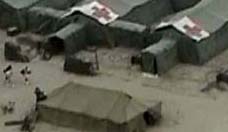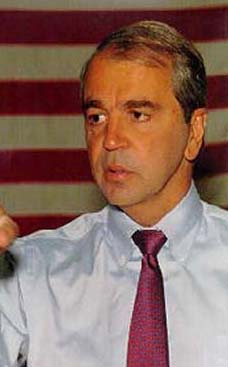
Growing out of a "drug tour" Theroux took to Ecuador in 2000, "Blinding Light" conjures up Slade Steadman, a blocked travel writer who goes to Latin American in search of a hallucinogenic drug called ayahuasca. "After trying the drug and hearing in a tent in Quito that Al Gore had won the presidency, Theroux returned to the US, discovered GeorgeW. Bush was President and quickly departed for Africa, where he had scheduled the trip he later wrote about in Dark Star Safari. He didn't pick up the novel until nearly two years later, by which point he had also written a collection of stories. Author Paul Theroux served as a Peace Corps Volunteer in Malawi in the 1960's.
Theroux's hallucinogenic journey
Seeing the light
John Freeman
August 06, 2005
BOOK Expo America is not the sort of event one imagines Paul Theroux enjoys very much. In a room big enough to hold a dozen football pitches, a human centipede of booksellers and critics weaves from booth to booth. Bagpipers greet visitors at the door and Harry Potter smiles down on the whole affair from banners above. His smile is the knowing grin of a boy about to make his billionaire creator even richer.
"This is how I write everything," Theroux says, flipping the page upside down so that its contents remain illegible. He then slides it back to his side of the table. "When I'm in Hawaii, sometimes I go out to the beach and sit in a chair and I can write for hours like this. And no one ever bothers me."
If Theroux has any complaints about this orgy of mercantilism, he keeps them private. After delivering a breakfast talk to booksellers about his new novel, Blinding Light, the famously prickly author coasts into the upstairs press room wearing a white linen blazer, white polo shirt and sneakers, and holding a leather travelling satchel from which he produces a legal pad covered in script.
The mixture of intimacy and withholding in this gesture is characteristic of Theroux in person. In spite of his quiet, almost surprisingly gentle voice, there is steeliness beneath his panache: the most seasoned travel writer in the US is not about to do an emotional striptease to make a few dollars.
That act he saves for his books, of which there have been nearly 40 in four decades: travelogues and stories, a play, more than a dozen novels, a cringingly honest memoir about his attempt to turn V.S. Naipaul into a mentor. There was even a novel (My Secret History) that purported to tell the real story of Paul Theroux. As with John Updike, it was hard to imagine any area of his life had gone undocumented.
Blinding Light reveals there is at least one left, and it might be the wildest one yet. Growing out of a "drug tour" Theroux took to Ecuador in 2000, the novel conjures up Slade Steadman, a blocked travel writer who goes to Latin American in search of a hallucinogenic drug called ayahuasca. "The man looks for a drug, finds the drug, becomes clairvoyant from it," says Theroux in a summary of the plot.
To a point, this itinerary resembles Theroux's own: with "try everything once" as a motto and William S. Burroughs's chronicle The Yage Letters as a beacon, he joined a group indulging in what he jokingly calls a little "ethnobotany". They hired a guide and a professional shaman. "The journey Burroughs took was so much tougher," he says, lamenting the facility of his own trip. "He was mugged, he was always walking down blind alleyways."
After trying the drug and hearing in a tent in Quito that Al Gore had won the presidency, Theroux returned to the US, discovered GeorgeW. Bush was President and quickly departed for Africa, where he had scheduled the trip he later wrote about in Dark Star Safari. He didn't pick up the novel until nearly two years later, by which point he had also written a collection of stories.
Steadman also has little trouble writing afterwards, but he winds up with one striking side effect from his drug-taking: temporary blindness. Consequently, he must rely increasingly on his one-time girlfriend, Dr Ava Kalsina, to whom he dictates The Book of Revelation, the steamy new novel that comes pouring out of him. Stories lead to fantasy, to re-enactment, and suddenly Steadman has no problems with "slackness" either.
"I saw writer's block as the impetus," Theroux says by way of explanation, "and writing as a form of vitality." Perhaps it was the near miss with a Bad Sex Award in 2003 for his novella The Stranger at the Palazzo d'Oro, but Theroux bristles at the suggestion his material might be labelled pornographic. "The kind of sex I'm writing about is ecstatic sex," he says. "It's not, you know, running in and nailing the woman next door. It's the ecstatic form of it. Where in a heightened state of stimulation, so many things are possible."
In preparation for the book, Theroux re-read erotic masterpieces by the likes of French poet Guillaume Apollinaire and novelist J.K. Huysman, but "you don't learn a lot from them", he says, fidgeting with the cuff of his shirt sleeve and revealing a small tattoo between thumb and forefinger, up near the wrist. "You can only basically write your own. It's so easy to mock eroticism that you just have to hope people aren't going to pick on you."
In recent years, this is something Theroux has had to deal with more and more as a traveller and a writer. Although younger than Philip Roth and Updike by a decade, he is very much a writer of their generation and the collection of novellas and stories that preceded this book was attacked in The New York Times for the anachronisms of its sexual politics. His recent book about Africa was criticised for being insufficiently respectful of indigenous culture.
Nevertheless, Theroux is not about to give up on what is essentially a voyeuristic mode of seeing the world. "For most people, voyeurism is a bad thing," he says, "but for a writer it's essential. Standing and gaping is the writer's role. It's why I have problems with people staying in one place [and] a tremendous affinity for writers who don't just live in cities but go out and confront the world."
Although once a small club, this group of globetrotting authors is slowly expanding, and chances are they have all read Theroux's Pulitzer Prize-winning Mosquito Coast, or The Great Railway Bazaar, his account of travelling by rail through Asia. There were other books, too, about Britain, Patagonia, the Pacific, the Mediterranean, the US.
Theroux's writing career began in the mid-1960s in Malawi, where he was a volunteer for the Peace Corps. His innocence lived and then died with the independence movement there, but he remains hopeful. "People say let's fix Africa, and I want to say, 'What's wrong with it?"'
Later, at a packed reading at Barnes& Noble, Theroux continues with this theme, becoming a kind of spokesman for the one thing he feels utterly unashamed schilling for: transgression through travel. "Brad Pitt is on TV now saying 'Save Africa'. What the hell does he know?" The crowd ripples uncomfortably but Theroux presses on. "There's this book out now that says the world is flat, which I must disagree with. There are countries out there now which are harder to get to than ever. And it's a mistake to think everywhere is the same."
He waves his hand at the spread of McDonald's and other multinationals. "The only way you're going to know that places are different beneath the facade is to go. Just go," he says. "Just go."
Blinding Light by Paul Theroux (Hamish Hamilton, $49.95).











